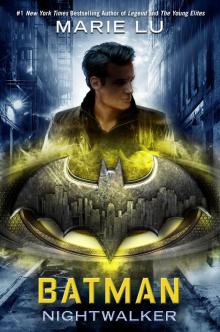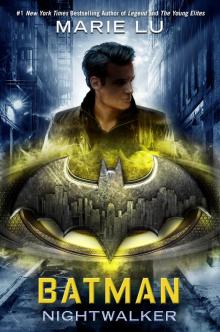The Kingdom of Back Read online
ALSO BY MARIE LU
Warcross
Wildcard
Batman: Nightwalker
The Young Elites
The Rose Society
The Midnight Star
Legend
Prodigy
Champion
Rebel
G. P. PUTNAM’S SONS
An imprint of Penguin Random House LLC, New York
Copyright © 2020 by Xiwei Lu
Map illustrations copyright © 2020 by Virginia Allyn
Penguin supports copyright. Copyright fuels creativity, encourages diverse voices, promotes free speech, and creates a vibrant culture. Thank you for buying an authorized edition of this book and for complying with copyright laws by not reproducing, scanning, or distributing any part of it in any form without permission. You are supporting writers and allowing Penguin to continue to publish books for every reader.
G. P. Putnam’s Sons is a registered trademark of Penguin Random House LLC.
Visit us online at penguinrandomhouse.com
Library of Congress Cataloging-in-Publication Data
Names: Lu, Marie, 1984– author.
Title: The Kingdom of Back / Marie Lu.
Description: New York: G. P. Putnam’s Sons, [2020]
Summary: “Desperate to be forever remembered for her music, Nannerl Mozart makes a dangerous pact with a mysterious stranger from a magical land, which may cost her everything”—Provided by publisher.
Identifiers: LCCN 2019002623 |
ISBN 9781524739010 (hardcover) | ISBN 9781524739027 (ebook)
Subjects: LCSH: Berchtold zu Sonnenburg, Maria Anna Mozart, Reichsfreiin von, 1751–1829—Juvenile fiction. | Mozart, Wolfgang Amadeus, 1756–1791—Juvenile fiction. | CYAC: Berchtold zu Sonnenburg, Maria Anna Mozart, Reichsfreiin von, 1751–1829—Fiction. | Mozart, Wolfgang Amadeus, 1756–1791—Fiction. | Musicians—Fiction. | Brothers and sisters—Fiction. | Mozart, Leopold, 1719–1787—Fiction. | Fantasy.
Classification: LCC PZ7.L96768 Kin 2020 | DDC [Fic]—dc23
LC record available at https://lccn.loc.gov/2019002623
Ebook ISBN 9781524739027
This is a work of fiction. All incidents and dialogue, and all characters with the exception of some well-known historical figures, are products of the author’s imagination and are not to be construed as real. Where real-life historical persons appear, the situations, incidents, and dialogues concerning those persons are entirely fictional and are not intended to depict actual events or to change the entirely fictional nature of the work. In all other respects, any resemblance to persons living or dead is entirely coincidental.
Jacket art © 2020 by David Curtis
Cover design by Kristie Radwilowicz
pid_prh_5.5.0_c0_r0
For Kristin, who believed first.
This is the book that started it all.
I’m forever grateful.
CONTENTS
Also by Marie Lu
Title Page
Copyright
Dedication
Mozart Family Map
Introduction
Salzburg, Austria: 1759
Mozart by the Ocean
The Waking Dream
The Boy from Another World
The Princeling in the Grotto
The Road to Vienna
The Secret Page
The Princeling in the Palace
The Night Flower
The Castle on the Hill
A Family of Dignified Reputation
The Ogre and the Sword
The Boy in Frankfurt
Who Directs the Orchestra?
The Arrow
The Château
A Dream Not Lived
Hyacinth’s Revenge
The Agreement
The Princess in the Tower
Letters from a Midnight Wood
The Ghost on the Parchment
The Return to Vienna
The Devil’s Dance
The Harbinger of Death
The Chosen Path
The Queen of the Night
The Return of the Queen
The End of the Beginning
Twenty-three Years Later: Sankt Gilgen, Austria, 1792
Kingdom of Back Map
Author’s Note
Acknowledgments
About the Author
I am going to tell you a story you already know. But listen carefully, because within it is one you have never heard before.
The story you know is about a boy named Wolfgang Amadeus Mozart.
You recognize his name. Even if you do not, you know him well, because you have heard his music all your life.
He was here and then gone, a brief, brilliant shard of life, a flash of stardust that ignited the sky. I knew his mind better than anyone else, understood its every winding path and quiet corner as deeply as my own. I remember everything about the way his tiny hand fit into mine, the sweep of his long lashes against his baby cheeks, the expression he would turn on me in the darkness of our shared bedchamber, his wide, fragile eyes glittering, always dreaming of some faraway place. I will tell you how the space in his small chest held so much joy and beauty that, if he wasn’t careful, it might all spill out into the streets, drenching the world in too much light. He knew this, and so he held back, made rigid symmetry of the unimaginable so that the world could understand it, and for that his music became all the more sublime.
The story you have never heard is about the sister who composed beside him. In a way, you know her too, for you have also heard her music all your life. She is not the stardust but the steady wick, the one who burns low and quiet. You do not see her by the way she lights up the sky but by the way she steadies herself against the darkness, alone, at night, beside a window while the world sleeps around her. She writes when others do not see. By morning, none would know that her flame had ever been there. Her music is the ghost in the air. You know it because it reminds you of something you cannot quite grasp. You wonder where you have heard it before.
The story you already know is set in a real land, full of real kings and castles and courts. There are long carriage rides and summer concerts and a little boy in a royal coat.
The story you have never heard is set in a dream of fog and stars, faery princelings and queens of the night. It is about the Kingdom of Back, and the girl who found it.
I am the sister, the other Mozart. And her story is mine.
SALZBURG, AUSTRIA
1759
MOZART BY THE OCEAN
Sometimes, a day comes along that seems possessed by a certain shade of magic. You know those moments. There is a peculiar pattern to the silhouettes of leaves quivering against the sunbeam on the floor. The dust in the air glows white, charmed. Your voice is a note suspended in the breeze. The sounds outside your window seem very far away, songs of another world, and you imagine that this is the moment just before something unusual happens. Perhaps it is happening right now.
My day of magic arrived on a bright autumn morning, when the poplar trees swayed against a golden city. I had recently turned eight years old. My brother, Wolfgang, was not yet four.
I was still playing through my exercises when Papa came through the door with Herr Schachtner at his side, the two of them discussing
some matter or other about the archbishop, their hair blown wispy from the bustle of the Getreidegasse, the city’s main thoroughfare, on which our home stood.
I paused in the middle of my arpeggios and folded my hands in my lap. Even now, I can remember the uneven stitching of my blue petticoat, my white hands against black clavier keys, the skeleton leaves clinging to Herr Schachtner’s shoulders. His voice had been steeped in something rich and baritone. The scent of the street—wind and smoke and baked bread—lingered like a perfume on his coat.
My lips were rosy and dry. My hair stayed neatly curled behind my neck in loose dark waves, held back with pins. I was still too young to fuss over my appearance, so my mother had left me in a simple state.
“Herr Schachtner!” My mother’s voice sweetened with surprise at the sound of men in the room. She said this as if we were not expecting him at all, the esteemed court trumpeter of Salzburg, as if we had not planned everything in advance for his visit. “Such talk of the archbishop and the orchestra, it’s no wonder you and my husband are always tired. Sebastian,” she added, nodding at our manservant. “The Herr’s coat and hat.”
Sebastian hung up the court trumpeter’s belongings. They were finely made, velvet encrusted with gold lining, his hat made of beaver pelt and trimmed with lace. Beside them, my father’s coat appeared worn, the threads thin at the elbows. My eyes wandered to the hem of my mother’s dress—it was fraying, the color dull. We were the look of a family forever on the edge of respectable.
My father was too busy with our guest to pay me any mind, but Mama noticed the stiffness in my posture and the paleness of my cheeks. She gave me an encouraging glance as she passed me.
Steady, little one, she had said to me earlier in the morning. You have practiced hard for this. Do not be nervous.
I kept her words in mind and tried to loosen my shoulders. But Papa had timed their arrival a bit too early this morning. I had only played my scales so far. My fingers had not yet shaken the cold from their tips, and when I pressed down on the keys, they still felt as if they were somewhere far away.
My brother stayed mercifully out of sight today, hiding somewhere in our parents’ bedroom, no doubt up to some mischief. I hoped he would remain quiet until Herr Schachtner left, or at least until I finished playing.
The Herr gave Mama a warm smile that crinkled the edges of his mouth and molded his face into a pleasant sight. “Ah, Frau Mozart,” he replied, winking at her as he kissed her hand. “I always tell Leopold how lucky he is to have found the rare woman with a good ear.”
My mother blushed and thanked him for his kind words. Her skirts glided against the floor as she curtsied. “I can only claim my gifted ear from my father,” she told him. “He was a talented musician, you know.”
As she moved, I memorized the polite tilt of her head and the way she tucked a stray hair behind her ear. Somewhere in those movements must have been her true reaction to his statement, but her face remained as it always was, serene and secretive, sweet and mild. It was clear she pleased the Herr, because his grin broadened.
“Yes, God has blessed me in many ways,” my father said. His smile was coiled as tightly as my nerves. His eyes flashed in my direction, hard and glittering. “Nannerl inherits her good ear from her mother, as you’ll soon see.”
It was my unspoken cue. At my father’s words, I rose obediently from my bench to greet our guest. Papa disliked it when I curtsied without stepping away from the clavier or let my gaze wander anywhere that was not the floor. He said it made visitors think me a distracted and careless young lady.
I could not give Herr Schachtner any reason to find me rude.
Serene and sweet. I thought of Mama and tried to imitate the way she had lowered her head just so, the demure way she’d swept her skirts across the floor. Still, my curiosity stirred, and my eyes darted immediately to the court trumpeter’s hands, searching for proof of musical talent in the way his fingers moved.
Mama called for Sebastian to bring some coffee and tea, but Papa waved her off. “Later,” he said. It was best, perhaps, if the Herr did not see our porcelain set. I pictured the old saucers with their small chips, the teapot’s fading paint. Mama had begged him for a new one for proper company, but it had been ages since we had a reason to entertain such guests. Until today.
Herr Schachtner brushed the leaves from the velvet of his justaucorps. “Thank you, Frau Mozart, but I will not stay long. I am here to listen to your lovely daughter’s progress on the clavier.”
“Johann followed me home after I mentioned Nannerl’s talents.” My father patted Herr Schachtner’s shoulder. “He could not help himself.”
“What luck,” Mama said. She arched a brow at me. “You are just in time, then. Nannerl happens to be in the middle of practicing.”
My hands trembled and I pressed them together harder, trying to warm them. Today would be the first time I ever performed for an audience. My father had sat at the clavier with me for weeks as we prepared, studying my technique, slapping my wrists when I erred.
Music is the sound of God, Nannerl, he would say. If given the talent, it means God has chosen you as an ambassador for His voice. Your music will be as if God has given you eternal life.
My father, God . . . there was little difference between them to me. A frown from Papa might as well have been a frown from Heaven, for what it did to my mood. Every night, I’d go to bed hearing the way my hands would move across the keys, the notes crisp in their perfection. I’d dreamed of how the Herr would stand, clapping heartily, and how my father would sit back in his chair with a satisfied smile. I’d imagined the Herr demanding I play before a wider audience. My father making the arrangements. Coins filling our family’s coffers and the strain easing from his eyes.
That was the reason behind everything this morning. Children my age, Papa said, could not play the clavier with the skill that I did. I was the miracle. Chosen by a divine hand. Destined to be noticed. If I could demonstrate this to Herr Schachtner, he could extend an invitation for me to perform before Herr Haydn, the most acclaimed composer in Austria. He would be my gateway to the royal courts of Europe, to the kings and queens.
From my hands could sing the voice of God, worth its weight in gold.
“Nannerl, is it?” Herr Schachtner’s voice addressed me.
I nodded in his direction. My chest fluttered as if it were brimming with moths. My fingers twitched, eager to dance. “Yes, Herr,” I said. The last time he visited our home, he had not noticed me. But, then, he had no reason to.
“How long has your papa instructed you on the clavier, Fräulein?”
“Six months, Herr.”
“And do you think you play well?”
I hesitated. It was a tricky question. I did not want to speak too proudly, so that he may think me arrogant, or too meekly, so thus a poor player. “I don’t know, Herr,” I finally said. “But I believe you will know best when you hear me.”
He laughed, pleased, and I allowed myself a small smile in relief. Men, my mother had always advised, were incapable of resisting praise. If you needed something from them, you first told them about all the ways they impressed.
When I chanced a look up at him, his smile widened and he tugged at both sides of his justaucorps’ collar. “Well, what a charming girl, Leopold,” he said to my father. “Delightfully reserved for her age. She’ll marry well, I’ll say.”
I turned my eyes down again, forcing a smile at his compliment, even as my hands tensed against the fabric of my dress. I’d once heard a coachman call his mare delightfully reserved as he tightened her bridle.
Papa turned to me. “We learned a new menuett yesterday,” he said. “Let’s start with that, Nannerl.”
It was not a new menuett, truthfully, but one that Papa had written for me weeks ago and that I’d practiced for ten days. But Herr Schachtner did not need to know that. So I sai
d, “Yes, Papa,” then sat back down at the clavier and reached for my notebook.
In my nervousness, I started to play before I had counted to three in my head. Careful, I scolded myself. Herr Schachtner would notice every mistake I made. I took a deep breath and let the world still around me. The slant of light in the air, the sound of my father’s voice, the weight of a stranger’s presence in the room. They faded now, leaving me with only my hands and the keys.
Here, I was alone. This was my world. I began to play and my fingers steadied against the music. A major scale, a shift, a drawn-out A, another scale, a trill. I closed my eyes. In the darkness, with only myself, I searched for the pulse of the music and let my hands find it.
It was like coming upon a web in the woods so fragile that a single puff of air would blow it away. I thought of the clouds right before they shifted, a butterfly on the underside of a leaf, velvet-white edelweiss on a lonely rock, rain at midnight against the windowpanes. When I played, it was as if I were discovering the harmony of everything I already knew, but in a way that revealed itself only to me.
My entire heart pulled with yearning at the music. I leaned into the web and let it encase me.
Then—
A bubble of laughter came from somewhere in my parents’ bedchamber. The web around me wavered, threads of it starting to burn away to reveal the room again, the light and the stranger and my father.
I furrowed my brows and tried to concentrate again. But from the corner of my eye, a blur of motion emerged from behind the bedroom door and ran over to where Papa sat. I caught sight of a head of warm brown curls. Small, stout limbs. A bright smile that beckoned to everything around him.
My brother, Wolfgang.
“Ah, Woferl!” I heard the familiar affection in Papa’s voice as he used my brother’s pet name. Of course, he did not scold him for the interruption. “What are you so eager about? It will have to wait. Do you see? Your sister is playing for us.”
My brother simply smiled and lifted himself up onto the tips of his toes to whisper something into Herr Schachtner’s ear. In spite of myself, I strained to hear what he said. My focus elsewhere, I felt my fingers speed up, disturbing the web in the woods and the flower on the rock. I bit my lip and forced myself back into rhythm.

 The Midnight Star
The Midnight Star Legend
Legend Prodigy
Prodigy Life Before Legend
Life Before Legend Legend Trilogy Boxed Set
Legend Trilogy Boxed Set Life Before Legend: Stories of the Criminal and the Prodigy
Life Before Legend: Stories of the Criminal and the Prodigy Wildcard
Wildcard The Rose Society
The Rose Society Warcross
Warcross Batman: Nightwalker
Batman: Nightwalker Skyhunter
Skyhunter The Young Elites
The Young Elites The Kingdom of Back
The Kingdom of Back Batman
Batman Champion: A Legend Novel
Champion: A Legend Novel Wildcard (Warcross)
Wildcard (Warcross)